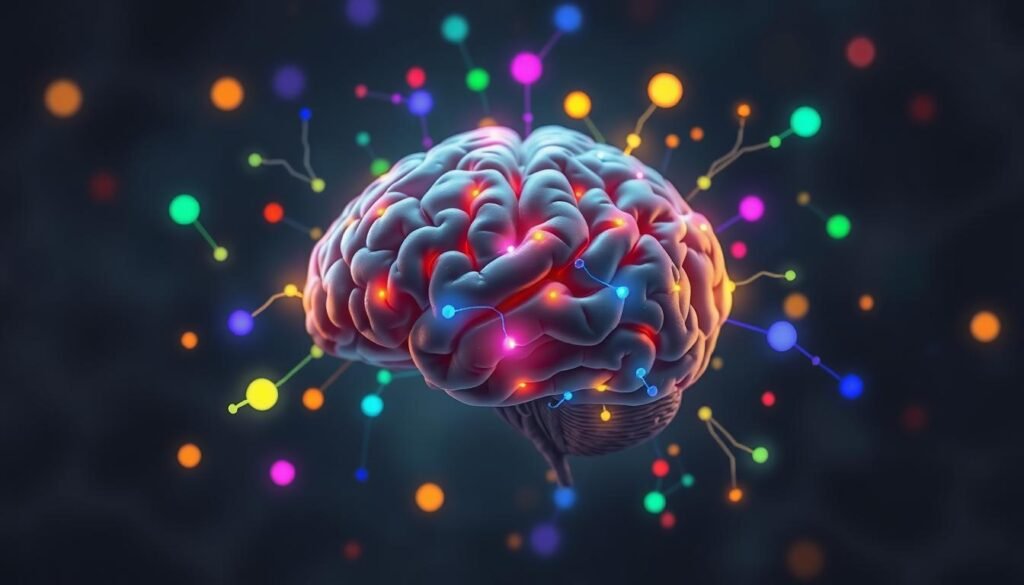Did you know over 13% of American adults take antidepressant meds? It’s key to grasp how these drugs affect brain chemistry. They treat depression by changing neurotransmitter levels, which helps nerve cells communicate better. Let’s explore how antidepressants work, their types, side effects, and how they help mental health.
Key Takeaways
- Antidepressants enhance neurotransmission by inhibiting monoamine reuptake and breakdown.
- The delayed response of antidepressants indicates the involvement of downstream mechanisms.
- Stress-induced changes in brain structure may be reversed by antidepressant treatment.
- SSRIs, TCAs, MAOIs, and atypical antidepressants are key classes of these medications.
- Potential side effects include nausea, weight gain, and mood fluctuations.
- Improvement in cognitive function and stability in emotional responses is often observed.
- Understanding the neurobiology of depression is essential for effective treatment strategies.
Understanding Mental Health and Its Importance
Mental health is vital for our overall well-being. It shapes how we think, feel, and behave. Good mental health improves how we handle daily life and face challenges.
It’s important to notice and care for mental health issues. Doing so helps us maintain a balanced life.
The Definition of Mental Health
Mental health covers our emotional, psychological, and social wellness. It influences our stress management, relationships, and decisions. Being mentally healthy is key to coping with life’s ups and downs.
Mental health can change due to many factors. These include life situations, genetics, and our surroundings.
Depression: A Common Mental Health Condition
Depression is a widespread mental health issue. It brings lasting sadness and a lack of interest in what we once loved. It makes daily activities hard.
Knowing the signs of depression is critical. Without help, mental health problems could get worse. This could lead to more serious health concerns.
| Aspect | Details |
|---|---|
| Mental Health Definition | Emotional, psychological, and social well-being |
| Importance | Influences daily functioning and quality of life |
| Common Mental Health Condition | Depression affects millions worldwide |
| Symptoms of Depression | Persistent sadness, loss of interest, daily Task difficulties |
How Antidepressants Work in the Brain
Understanding how antidepressants work is crucial for those dealing with mental health challenges. These meds mainly affect the brain’s neurotransmitters, which control mood and feelings. By focusing on key neurotransmitters like serotonin and norepinephrine, antidepressants help reduce depression and anxiety symptoms.
The Role of Neurotransmitters
Neurotransmitters are vital for brain communication. They impact our emotions, thoughts, and actions. Antidepressants work by boosting serotonin levels, a key mood stabilizer.
By blocking serotonin’s reabsorption, these drugs make more of it available. This enhances mood control and lessens sadness. Learn more about how antidepressants support mental health here
Rebalancing Brain Chemistry
Correcting brain chemistry is key for people with mood issues. Various antidepressants, like SSRIs and SNRIs, affect neurotransmitter systems differently. It often takes weeks for these meds to fully work, needing dose changes for best serotonin levels and brain function.
These adjustments underline the need for regular talks with healthcare providers. They help customize treatment plans to meet individual requirements.
Antidepressants and Their Effect on Brain Chemistry
Depression affects the brain, particularly areas like the prefrontal cortex and hippocampus. These changes can make the brain work less well, leading to feelings of hopelessness. Antidepressants help by improving how these brain areas work, maybe even fixing some of the damage caused by stress and depression.
The Neurobiology of Depression
To understand how antidepressants help, it’s important to know about depression’s effects on the brain. These drugs mainly correct chemical imbalances, easing symptoms of depression. The type of antidepressant and the person’s brain chemistry play roles in its success. Typically, people start feeling better after using these drugs for four to six weeks.
Different Types of Antidepressants
Knowing the different kinds of antidepressants is key to treating depression. Here are the most common types:
- Selective Serotonin Reuptake Inhibitors (SSRIs) – These are preferred because they have fewer side effects. They help with depression and anxiety.
- Serotonin-Norepinephrine Reuptake Inhibitors (SNRIs) – These are good for depression and chronic pain by adjusting serotonin and norepinephrine.
- Tricyclic Antidepressants (TCAs) – They’re effective but not as common due to more side effects like weight gain and dizziness.
- Monoamine Oxidase Inhibitors (MAOIs) – Older but effective, these require careful food choices to avoid bad reactions.
- Atypical Antidepressants – Used when SSRIs or SNRIs don’t work or cause harsh side effects.
Each antidepressant type works differently, leading to various effects on medication. Working with healthcare providers is crucial to find the best treatment. The right approach can greatly improve life quality while keeping side effects low, especially with SSRIs and SNRIs.
Types of Antidepressants
It’s important to know about different antidepressant types for treating mental health issues. Each type acts uniquely on the brain’s chemistry. This results in various effects and possible side effects. Below, we summarize the main types of antidepressants and their uses.
Selective Serotonin Reuptake Inhibitors (SSRIs)
SSRIs are a top choice for many doctors. They boost serotonin in the brain, helping improve mood. Popular SSRIs include:
- Fluoxetine (Prozac)
- Sertraline (Zoloft)
- Citalopram (Celexa)
- Escitalopram (Lexapro)
- Paroxetine (Paxil)
These drugs are favored because they usually have milder side effects.
Serotonin and Norepinephrine Reuptake Inhibitors (SNRIs)
SNRIs lift mood and energy by increasing serotonin and norepinephrine. Often prescribed examples include:
- Duloxetine (Cymbalta)
- Venlafaxine (Effexor XR)
- Desvenlafaxine (Pristiq)
- Levomilnacipran (Fetzima)
These are good for those struggling with both depression and anxiety.
Tricyclic Antidepressants (TCAs)
TCAs like amitriptyline and nortriptyline (Pamelor) came first in depression treatment. They are effective but can cause more side effects.
Given their risks, doctors turn to TCAs when other treatments fail.
Monoamine Oxidase Inhibitors (MAOIs)
MAOIs are for severe depression due to serious side effects and food restrictions. Drugs like phenelzine (Nardil) and tranylcypromine (Parnate) block breakdown of certain brain chemicals.
It’s crucial to monitor those on MAOIs to avoid dangerous interactions with certain foods and drugs.
Atypical Antidepressants
Atypical antidepressants target different brain chemicals in unique ways. Noteworthy ones include:
- Bupropion (Wellbutrin)
- Trazodone
- Mirtazapine (Remeron)
- Vilazodone (Viibryd)
- Vortioxetine (Trintellix)
These drugs often have fewer sexual side effects, which many patients prefer.

Choosing an antidepressant depends on the patient’s specific needs, considering effectiveness and side effects. Knowledge of these five main types can improve conversations between patients and healthcare professionals.
The Impact of Antidepressants on Neuroplasticity
Antidepressants and neuroplasticity have a fascinating connection important for brain health. Neuroplasticity is the brain’s amazing skill to change by making new connections. This ability is key for fighting depression and aiding mental recovery.
Neuroplasticity: Understanding Brain Changes
Brain changes that boost mental strength depend on neuroplasticity. Chronic stress hurts the growth of new neurons, affecting how we think and feel. Studies show this effect in humans and animals alike. The dentate gyrus in the hippocampus is vital for making new brain cells. It helps us deal with emotions and tell apart similar experiences.
How Antidepressants Foster Neuroplasticity
Studies show antidepressants can significantly improve brain flexibility. For instance, SSRIs help grow new neural stem cells and turn them into neurons. This leads to better brain function, especially in the hippocampus. Combining this with exercise and good surroundings can greatly help mental health.
Long-term use of antidepressants helps reorganize brain networks. This change makes the brain better at adapting. It not only lessens depressive symptoms but also improves emotional health. This builds a stronger mental foundation.
Cognitive and Emotional Effects of Antidepressants
Antidepressants are key in boosting brain function and balancing emotions for those struggling with mental health. They help improve how the brain works, which lets people do their daily tasks better. We will look at how these medicines help the mind and feelings, including making emotions more stable and changing behavior.
Improving Cognitive Function
Studies show that SSRIs, a type of antidepressant, help with memory and concentration. They change the levels of brain chemicals, making thoughts clearer. People on these drugs often say their thinking gets better, helping them at work and in social life.
Stabilizing Emotions and Mood
Antidepressants are also great at making emotions steadier. They lower mood swings and sadness. This is a big help for those with depression. Over time, users often feel more emotionally steady. This makes life better. It helps them handle stress well and be stronger overall.
Behavioral Improvements
When people take antidepressants, their behavior often gets better too. They may sleep more, eat better, and have more energy. As their mood gets better, they are more active and connect more with others. This shows how their life improves with antidepressant use.

Potential Side Effects of Antidepressants
Many people find their mental health improves with antidepressants. But it’s important to know the possible side effects. Physical and psychological impacts vary from person to person. Knowing these can help you talk better with your doctor.
Common Physical Side Effects
Antidepressants can have different physical effects. You might feel:
- Agitated, shaky, or anxious. This happens in 20-25% of people taking SSRIs and SNRIs.
- A dry mouth, especially with tricyclic antidepressants. It occurs in 15-20% of users.
- Hyponatraemia, a serious decrease in sodium levels, in 5-10% of older adults on SSRIs.
- A higher chance of getting type 2 diabetes. This affects about 2-5% who use SSRIs and TCAs long-term.
Psychological Side Effects
Antidepressants can also affect your mind and emotions. You may notice:
- Mood swings or emotional ups and downs during treatment.
- Thinking about self-harm or suicide, less than 1% affected, mainly under 25s.
- Post-SSRI sexual problems, 34% have reported issues, with 4.3% saying it’s a big problem.
Talking with your doctor about side effects is key. Understanding them helps manage your treatment better. For deep insights on antidepressant side effects, check out this link.
Long-Term Effects of Antidepressants
Long-term use of antidepressants affects both mental and physical health. It leads to changes because the brain adjusts to these meds over time. Knowing these effects is key for those on or thinking about long-term antidepressant treatment.
Physiological Changes Over Time
Antidepressants used for a long time can change the body in ways you might not see right away. For example, 72% report sexual issues. About 65% say they’ve gained weight. Also, 65% feel emotionally numb, and 54% feel like they’re not themselves anymore.
Even with antidepressants, 30% still face deep depression. This makes people wonder if long-term use is effective. Around 43% feel hooked on their meds. Alarmingly, 36% have thought about suicide while on these drugs. These facts show why we must watch and care for those in treatment.
Managing Withdrawal Symptoms
Planning to stop antidepressants? Handling withdrawal is crucial. 74% of long-term users face withdrawal issues. This shows many need help to stop safely. NICE suggests reducing the dose slowly over four weeks to ease withdrawal. New advice may allow even more gradual changes.
Withdrawal often lasts a week with symptoms like dizziness and anxiety. Tapering off some drugs can be hard. Support and knowledge are vital. This shows the challenge of stopping antidepressants while keeping mental health stable.

Integrating Antidepressants with Other Treatments
Mixing treatments for depression helps patients recover faster. Using therapy with antidepressants offers a full plan that looks at biological, psychological, and lifestyle elements. This strategy helps with depression symptoms and supports staying well and strong.
Therapy and Lifestyle Changes
Therapy and antidepressants are powerful against major depression. Cognitive-behavioral therapy (CBT) and selective serotonin reuptake inhibitors (SSRIs) such as fluoxetine work well together. Adding healthy habits like exercise, a good diet, and mindfulness can make a big difference. These habits lessen symptoms and boost life quality. They give people ways to manage feelings and cope better.
Exploring Alternative Treatment Options
When usual antidepressants don’t work, looking at other options is crucial. Treatments like transcranial magnetic stimulation (TMS) and ketamine infusions are becoming popular. These new methods are especially helpful for ongoing depression. As treatments evolve, using these options with medication offers a full care package. This approach helps to better understand depression and tackle it effectively.
People with major depression need care tailored to them. It’s key to look at their genetic makeup and how they process emotions. Research shows knowing how the brain works is vital to find the best treatment. Combining alternative therapies with usual treatments is effective. For more info, check out studies like this one.
Conclusion
Understanding how antidepressants work is key for those facing depression. About 6.6% of U.S. adults use them to fight depressive episodes. These drugs balance chemicals in the brain like serotonin, which improves mood and well-being.
Today’s mental health treatment combines meds, therapy, and lifestyle changes. This mix helps people face depression from all sides. It makes overcoming mental health challenges easier.
Learning more about these treatments helps everyone. It makes it easier for people with depression to improve their lives. This knowledge is vital for enhancing the quality of life for those affected.